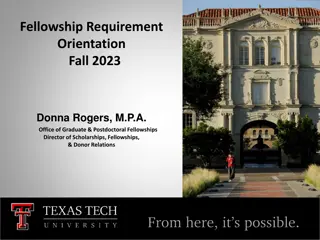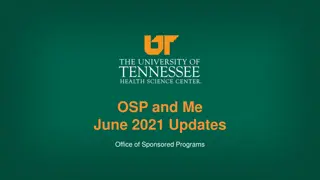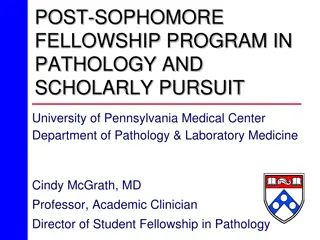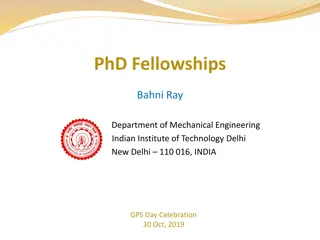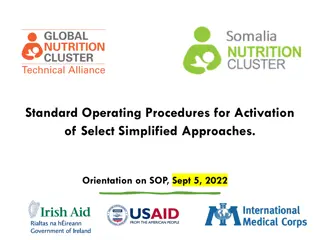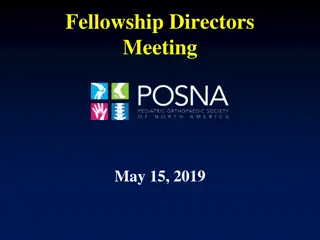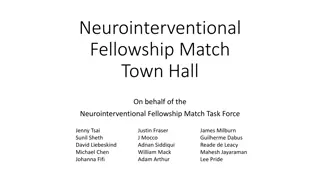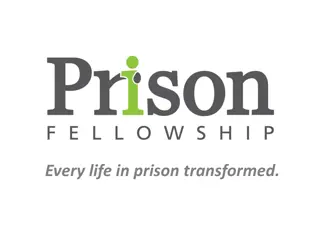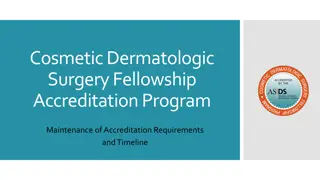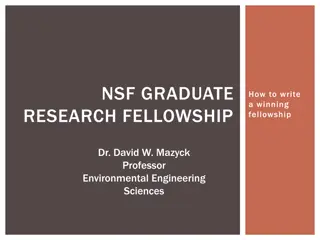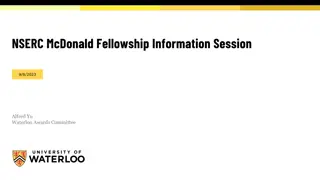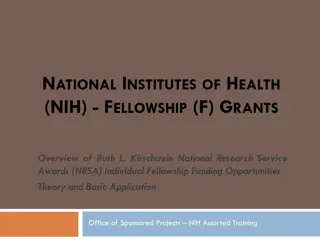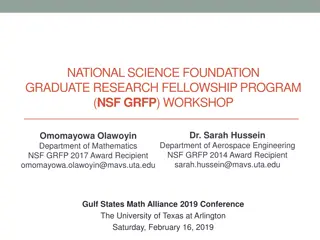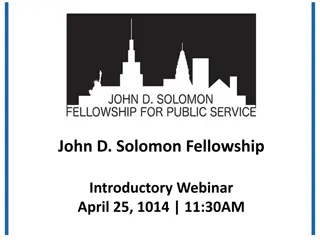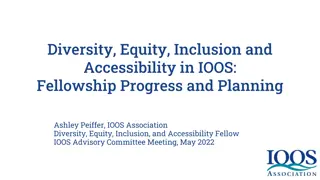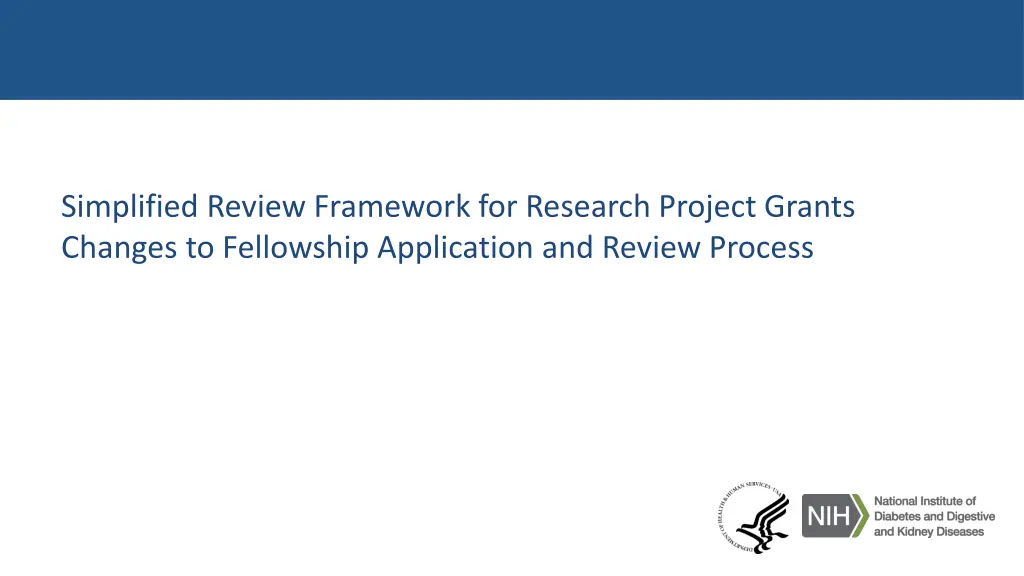
Simplified Review Framework for Research Project Grants Changes
Learn about the upcoming changes to the fellowship application and review process for NIH research project grants, aimed at enabling better focus for peer reviewers, reducing reputational bias, and easing reviewer burden. The simplified review framework reorganizes criteria into three factors, improving reviewer focus, reducing bias, and reallocating review considerations. Implementation is set for January 25, 2025.
Download Presentation

Please find below an Image/Link to download the presentation.
The content on the website is provided AS IS for your information and personal use only. It may not be sold, licensed, or shared on other websites without obtaining consent from the author. If you encounter any issues during the download, it is possible that the publisher has removed the file from their server.
You are allowed to download the files provided on this website for personal or commercial use, subject to the condition that they are used lawfully. All files are the property of their respective owners.
The content on the website is provided AS IS for your information and personal use only. It may not be sold, licensed, or shared on other websites without obtaining consent from the author.
E N D
Presentation Transcript
Simplified Review Framework for Research Project Grants Changes to Fellowship Application and Review Process
Simplified Review Framework for NIH Research Project Grants 2
Changes Coming: Simplified Review Framework for NIH Research Project Grants Goals: 1. Enable peer reviewers to better focus on answering the key questions necessary to assess scientific and technical merit o Should the proposed research project be conducted? o Can the proposed research project be conducted? 2. Mitigate the effect of reputational bias 3. Reduce reviewer burden Guide Notice NOT-OD-24-010 When? Applies to most research project applications submitted for January 25, 2025 due dates 3
What Will Change Under the Simplified Review Framework for Research Project Grants? 1. Improve reviewer focus - Existing five review criteria reorganized into three factors - Some Additional Review Criteria (inclusions, study timeline) related to human subjects moved to Factor 2 2. Reduce reputational bias Investigator/Environment will be evaluated as sufficient or gaps identified (considered in overall impact score, but no individual score) 3. Reduce reviewer burden Most Additional Review Considerations shifted from reviewers to NIH staff Improve identification of the strongest, potentially highest-impact research 4
The Simplified Review Framework Reorganizes Five Regulatory Criteria into Three Factors On or after Jan 25, 2025 - Simplified Framework (all considered in Overall Impact Score) Factor 1: Importance of the Research Factor 1: Importance of the Research Significance, Innovation S Scored 1 cored 1- -9 9 Factor 2: Rigor and Feasibility Factor 2: Rigor and Feasibility Approach (also include Inclusions and Study Timeline for clinical trials) Scored 1 Scored 1- -9 9 Factor 3: Expertise and Resources Factor 3: Expertise and Resources Investigators, Environment Evaluated as appropriate or gaps identified; gaps require explanation Considered in overall impact; no individual score Considered in overall impact; no individual score Before January 25, 2025 Significance - scored Investigator(s) scored Innovation scored Approach scored Environment - scored 5
Details on Factor 1- Importance of the Research Combines Significance and Innovation criteria Significance Evaluate the importance of the research in the context of current scientific challenges and opportunities. Assess the rationale for the proposed study in the context of the current literature and preliminary data. Innovation Assess whether the proposed work applies novel concepts or approaches in ways that will enhance the impact of the project. Scored 1-9 6
Details on Factor 2 - Rigor and Feasibility Assesses Approach Rigor Evaluate the potential for the work to produce unbiased, robust, reproducible data based on: Experimental design and proposed analyses Inclusion of Women, Minorities, and Across the Lifespan Study Timeline (for clinical trials) Feasibility Assess whether the studies can be completed well within the proposed timeframes and considering: Potential challenges and alternative approaches The impact of uncertainties in light of potential advances Scored 1-9 7
Details on Factor 3- Expertise and Resources Combines Investigator and Environment criteria Investigator Evaluate whether the investigator(s) have demonstrated background, training, and expertise, as appropriate for their career stage, to conduct the proposed work. For Multiple Principal Investigator (MPI) applications, assess the quality of the leadership plan to facilitate coordination and collaboration. Environment Evaluate whether the institutional resources are appropriate to ensure the successful execution of the proposed work. Selection of either Appropriate or Additional Expertise and/or Resources Needed (if gaps, narrative explanation required). No individual score; affects Overall Impact Score 8
Changes Coming: Simplified Review of Research Project Grant Applications What s the scope of the changes? Affecting RPGs with the following activity codes: R01, R03, R15, R16, R21, R33, R34, R36, R61, RC1, RC2, RC4, RF1, RL1, RL2, U01, U34, U3R, UA5, UC1, UC2, UC4, UF1, UG3, UH2, UH3, UH5, (including the following phased awards: R21/R33, UH2/UH3, UG3/UH3, R61/R33) When will the Simplified Framework be Implemented? Applies to applications submitted for January 25, 2025 due dates Summer 2025 peer review and October 2025 Advisory Council Learn more: grants.nih.gov/policy/peer/simplifying-review.htm 9
Learn More & Stay Informed Development background Description of changes Guidance for reviewers Guidance for applicants Training and resources Notices and reports FAQs Contacts grants.nih.gov/policy/peer/simplifying-review.htm 10
April 17, 2024 Public Webinar What: Details on the reissuance of funding opportunities affected by the Simplified Review Framework for Research Project Grants When: April 17, 2024 from 1-2 PM ET Where: View recording after event: https://grants.nih.gov/learning-center/srf- updates-to-funding-opportunities Subscribe to the NIH Guide to stay abreast of future webinars and related announcements. https://grants.nih.gov/funding/subscribe.htm 11
Revisions to the Fellowship Application and Review Process 12
Changes Coming: Revisions to NIH Fellowship Application and Review Criteria Aims: 1. Better focus reviewer attention on three key assessments: the fellowship candidate s preparedness and potential, research training plan, and commitment to the candidate. 2. Ensure that a broad range of candidates and research training contexts can be recognized as meritorious by clarifying and simplifying the language in the application and review criteria. 3. Reduce bias in review by emphasizing the commitment to the candidate, without undue consideration of sponsor and institutional reputation. Guide Notice NOT-OD-24-107 Scope: Applies to all fellowship applications submitted for due dates after January 25, 2025 13
Impending changes to NIH fellowship process Why? 1. Community concerns about fairness, bias, and openness of the process 2. NIH data show applications are highly concentrated in a small number of institutions 3. NIH data show applications from senior sponsors and institutions that submit many applications do much better than other applications 4. The aim is to encourage candidates from broader academic, institutional, and research backgrounds to apply 14
The Changes are Meant to Cast a Wider Net The changes are meant to make the application process simpler and more equitable. The revised review criteria allow NIH to cast a wider net in identifying promising scientists by decreasing the reliance on narrow markers of academic success and reducing the impact of sponsor or institutional reputation. The aim is to encourage candidates from broader academic, institutional, and research backgrounds to apply. 15
Highlightsof the Changes Redefined review criteria Candidate criteria encompasses a wider range of indicators of scientific potential and preparedness to better identify promising scientists The Research Training Plan reframes the research project in terms of its value as a training vehicle and as part of the overall training plan of the fellowship Evaluations of the sponsor and institutional environment de-emphasize track record and instead emphasize their contributions to the current candidate s research training plan Revised fellowship application Shorter, more structured, aligned with the new review criteria Less emphasis on sponsor track record, more emphasis on the research training plan and candidate preparedness Defined who should author each section Updated Reference Letter instructions 16
Reorganized Fellowship Review Criteria Current Fellowship Review Headings New Fellowship Review Headings Fellowship Applicant Candidate Preparedness and Potential Sponsors, Collaborators, Consultants Research Training Plan Research Training Plan Commitment to Candidate Training Potential No changes to Additional Review Criteria or to Additional Review Considerations Institutional Environment & Commitment to Training 17
Notable Revisions to Application Instructions 1. Applicant Section (now Candidate Section ) Candidate biosketch: Grades will no longer be required or allowed Candidates will be required to submit four personal statements: (1) professional and fellowship goals; (2) fellowship qualifications; (3) self-assessment; and (4) scientific perspective 2. Research Training Plan Section The headings of some sections have been revised to emphasize the importance of training in the fellowship plan The section Selection of Sponsor and Institution has been removed in favor of including the information elsewhere in the application The sections include: (1) Training Activities and Timeline; (2) Research Training Project Specific Aims; (3) Research Training Project Strategy, including the Scientific Foundation & Rationale and Approach 18
Notable Revisions to Application Instructions 3. Candidate Sponsor and Co-sponsor Section (now Commitment to Candidate, Mentoring, and Training Environment ) Sponsors and Co-sponsors will be required to submit five statements: (1) Mentoring Approach and Candidate Mentoring Plan; (2) Prior Commitment to Training and Mentoring; (3) Commitment to the Candidate s Research Training Plan; (4) Research Training Environment; and (5) Candidate s Potential. A sixth statement on Clinical Training will be required for candidates proposing to gain clinical trial experience 19
Public Website on the Revisions to Fellowship Application and Review Rational for the revisions Description of the changes to application and review Applicant guidance Reviewer guidance Training and resources Notices, blogs, and reports FAQs Contacts 20 Link: grants.nih.gov/policy/peer/revisions-nih-fellowship-application-review-process.htm
Public Webinar September 19, 2024 Join us for a public webinar on September 19, 2024, from 2 3PM ET This webinar will explain the changes coming to the NIH fellowship application and review process and offer an opportunity to have your questions by NIH experts during a live Q & A Register at: grants.nih.gov/learning-center/fellowship-application-review-process-revisions-webinar 21
Resources Coming Soon - Simplified Review of Research Project Grants FAQs - Simplified Review Research Project Grants Coming Soon - Revisions to NIH Fellowship Application and Review Process FAQs - Revisions to NIH Fellowship Application and Review Process Review for NIDDK NIDDK Research and Funding Information Mock NIH Peer Review Meeting Video Applicant Information Review Meeting Rosters NIH CSR Early Career Stage Reviewer Program NIH CSR Overview Overview of Peer Review 22
Important NIH Policy Application Page Limits Appendix Material - Limited Post Submission Material - Limited Resubmission Applications 23
Appendix More Fellowship Details Follows 25
Revisions to the Fellowship Application Structure 26 Highlighted sections reflect changes to the application structure
Fellowship Applicants What Application Forms do I Need? Forms and instructions for applications submitted after January 25, 2025 will become available in late November 2024. These forms and instructions will be included in the notices of funding opportunities; supplemental application instructions will also be available on the Grants Application Guide. o Are you applying for a fellowship prior to Jan 25, 2025? Use the current forms and instructions referenced in active funding opportunities and on the Grants Application Guide. For NIH-wide funding opportunities, standard due dates are available here. o Because forms and instructions are changing significantly for application due dates on or after January 25, 2025, candidates planning to apply after January 25, 2025 may wish to wait for updated forms and instructions coming in the fall of 2024 before preparing their applications 27
Fellowship Applicants Can I Use an Old Application as a Template? Applications submitted on or after January 25, 2025will differ significantly from those submitted previously. Changes will affect the materials submitted by the candidate, sponsor(s), and referees. NIH is revising the instructions for reference letter writers. Revised instructions will be available on the NIH Grants page on Reference Letters later in 2024. The changes are meant to ensure that letters better assist reviewers in understanding the candidate s strengths, opportunities for growth, and potential to pursue a productive career within the biomedical research workforce. This means that letter writers will need to carefully tailor new letters to the candidate s application. 28
Fellowship Applicants What About Resubmissions? Resubmission applications will be reviewed as they are presented at the time of receipt using the guidelines in place for that application due date. 29
Reviewer Bias Training NIH Center for Scientific Review Advisory Council Working Group External Advisory Committee NIH Staff Provide a broad range of perspectives Develop training and scenarios to mitigate biases All NIH reviewers are required to complete training SROs have also taken the training CSR Initiatives to Address Bias in Peer Review CSR Working Group Members 30

